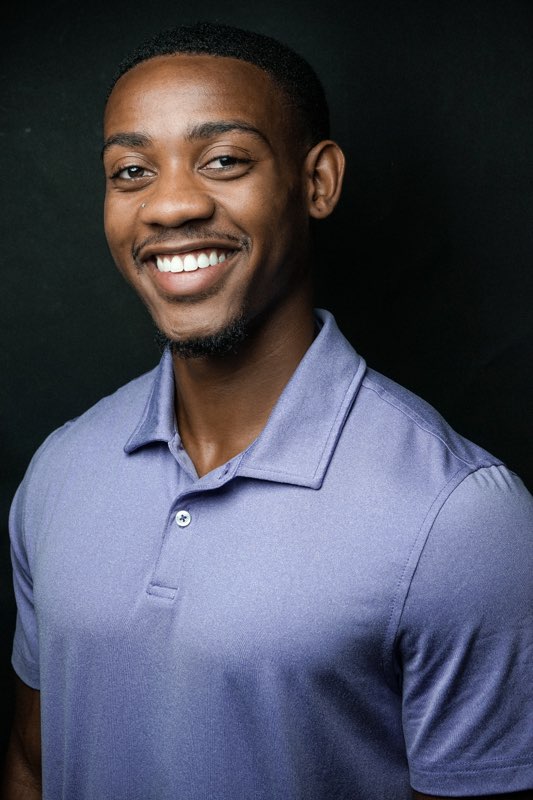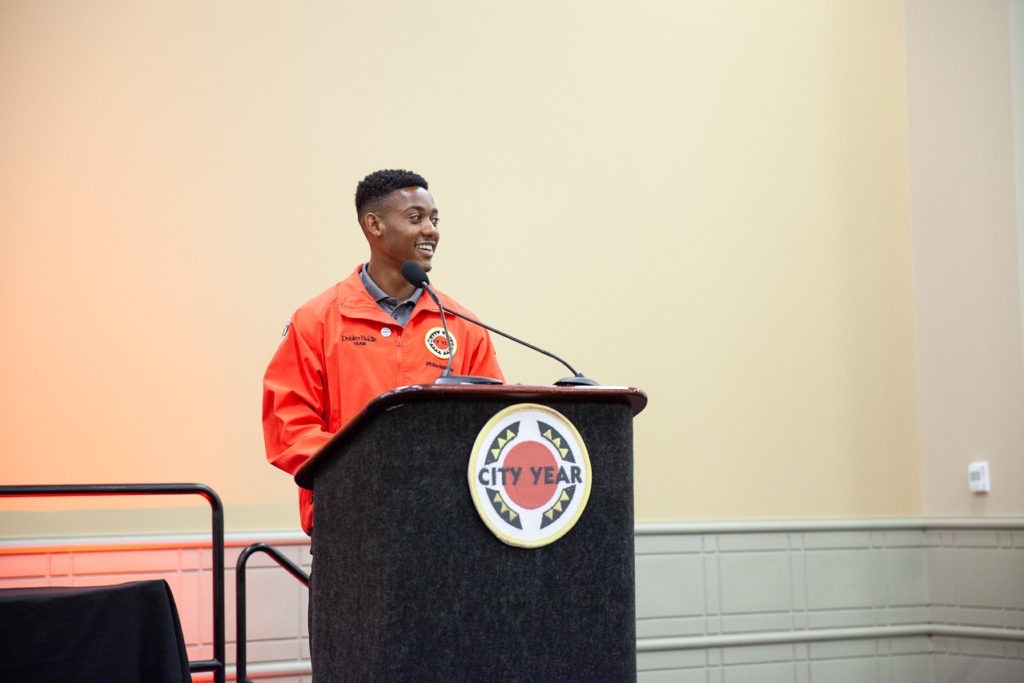Leadership After City Year: From Corps Member to Law School, Latin America, and Beyond

For Michael Harding, life since graduating from City Year Philadelphia in June of 2019 has been a continued pursuit of service to others. The CYP alum, who served at Thurgood Marshall Middle School during the 2018-2019 academic year, spent his summer after graduation running a mentorship program for a group of high school students. That fall, he enrolled in his first semester as a Public Interest Scholar at Villanova Law School followed by a 10-month leave of absence to travel to Chile as a Fulbright Scholar. With backing from the prestigious Fulbright Scholarship, Michael’s area of study centered on the role of memory injustice and human rights; specifically, using traumatic memory to obtain social justice and equality.
Sadly, the global pandemic COVID-19 disrupted Michael’s time in Chile, and he was forced to return home after just one month. Disappointing to say the least, says Michael, but his life’s calling to help as many people as he can remain steadfast as ever.
His work hasn’t gone unnoticed. Most recently, Michael was featured in the Spotlight Guide 2020 published by Mayor Kenney’s Office of Black Male Engagement alongside other key figures including Philadelphia School District Superintendent Dr. Hite, prominent attorneys, educators, and activists.
Here’s Michael’s story on Leadership After City Year.
What has life been like for you since graduating CYP?
Over the summer I worked for Education Works where I ran a mentorship program for a group of high school students. It was a social action project on criminal justice reform in Philly. From there I enrolled in my first semester of law school at Villanova Law.
What has the law school experience been like?
I’m enrolled as a Public Interest Scholar. Villanova awards a full scholarship to three students who are dedicated to public service and want to use law for it. I spent my first semester getting acclimated to law school and learning to think more like a lawyer. It’s a very different way of seeing the world.
Overall, the experience was positive. I learned a lot about myself and adversity. I walked away from that first semester with good relationships with professors and a deeper understanding of why I want to use the law to effect social change and policies. That first semester was very hard but worth it.
You then took a leave of absence from law school. Why?
Villanova allowed me to do a leave of absence for 10 months so that I could travel to Chile as a Fulbright Scholar.
What does it mean to be a Fulbright Scholar?
It’s a prestigious scholarship similar to the Rhodes Scholarship in terms of the opportunity to go abroad. The program I went through allows recent graduates or students who are Ph.D. students to go abroad and complete research, or gain an advanced degree abroad, or teach English for a year. It’s meant as a cultural exchange program in that you’re going as a student, but also as a cultural ambassador for the U.S.

What did you spend your time studying?
I chose to travel to Latin America because my project focused on memory and justice and human rights. Latin America has had a number of dictatorships in the last 40-50 years. Because of periods of dictatorship or abuse, society often uses traumatic memory in productive ways.
Specifically, Chile had a dictatorship that ended in 1990, but in the last 30 years, has worked to use memory to get justice for society members. The current generation is using historical memory to inform better access to equality and so on, including pushing for a new constitution.
There are parallels between black peoples’ use of traumatic memories of slavery in the U.S., the symbolic racism of confederate monuments, etc. and using these memories to inform the current push for racial justice here.
How has the COVID-19 pandemic impacted your work?
While I was in Chile, the State Department sent out an initial directive where we were told to leave then or stay. The week after, it became much more forceful to come home. This was the case for Fulbrights around the world.
The pandemic disrupted the entire experience. I’d been there for one month and was starting to get used to living and working there, and my network was growing. At this point, it looks highly unlikely I’ll be able to go back. Despite the unfortunate circumstances, I’ve technically been deemed a Fulbright alum; just nine months earlier.
What’s next for you?
I can’t go back to law school until January because of the leave of absence I was granted to go to Chile. I just received an offer to work as an intern with Justice at Work, a legal aid organization in Philly. I’ll work with them over the summer and I’m still working out what I’ll be doing in the fall.
What about your longer-term career goals?
If I was incredibly blessed, I would love to be able to run for President of the United States one day. That is my ultimate dream goal. That’s not an end, more so a means to an end in that it provides a platform to effect social change on a large scale. In more of the immediate term, I want to graduate from law school to become a Civil Rights attorney then run for local office and state office in Philadelphia or throughout the county. In a nutshell, I want to be a public servant in law and politics and that is what I am focused on.

Switching gears, you were recently recognized in the 2020 Spotlight Guide from the Mayor’s Office of Black Male Engagement. What was that like for you?
It was really humbling. When I saw the others who were featured — university presidents, lawyers, CEOs, Superintendent Hite, also young people like me who are community activists, teachers, mentors, for black and brown people — it was another reminder of not only what I can be capable of doing, but what my community can do. In particular, black men can have this very powerful impact in their community for black people or people at large. It became more motivation to keep doing things not for myself, but for others.
When you were with CYP, you also authored a news column on the importance of black male educators, any connections?
Absolutely a connection. The core of the work I’ve done and what I want to do is provide more opportunities for black boys and girls and access to what they want to pursue, whether through mentorship, conversation, or example. Therefore, the correlation is the overarching message of building community and opportunities through relationships.
Speaking of CYP, what do you miss about City Year?
I definitely miss my students. I visited them not too long ago before I left for Chile and I’m still mentoring some of them in helping them choose high schools. I miss my CYP team for sure. Just the community too and feeling like you were a part of something where everyone was motivated by the desire to help the community in some way, whether mentorship of students or a larger initiative.
What were some skills and/or lessons that you took away from your City Year experience?
The first thing I always think when I am asked this question is the ability to communicate. I think that the ability to adapt and be versatile with your communication is huge. Being able to communicate effectively with young people in a way that they understand you, where there is mutual respect, and where they grasp a lesson and apply it into practice is huge. Through my experience I have seen that kids are like sponges – they absorb everything and are always watching you. For me, the ability to communicate effectively and being cognizant of how your words have an impact on the kids I served was huge.
Also, time management; just being able to be on top of different tasks and navigate through all the metrics that we had to hit.
Finally, teamwork or the ability to work within a school setting. While you are responsible for your own set of students in a classroom, it doesn’t work unless you are able to work with your teammates as well. The team must work as a well-oiled machine, where it’s not rigid, everyone is working together; it’s fluid. I walked away with the ability to coordinate my time, schedule, strengths, and weaknesses with my teammates. We found ways to leverage our different strengths and weaknesses to get the job done the best way we could.
In what ways are you currently still involved with City Year?
I stay connected to mentors that I’ve had at City Year, one being the Executive Director Darryl Bundrige. He has been a mentor for me and provided me with a lot of great advice during and after my time at City Year. As I mentioned, I also stay in touch with my students and the Thurgood Marshall school community. I built a strong connection with a student last year and I continue to provide her with many tools, resources, and advice that will help her get one foot in the door. That is how I have been staying in touch with City Year.
Why would you recommend City Year to others?
I would recommend City Year because I believe in the organization’s values. City Year has a positive impact on education, particularly in Philadelphia. I have seen firsthand the effect that it has on students, parents, and school culture. The City Year experience is also a transformational experience. You will have the chance to grow intellectually, emotionally, and spiritually throughout your time of service. It will open your mind up to how education, mentorship, and investing in young people can change lives.
What advice would you give to any prospective City Year AmeriCorps members?
Never waste a day. Never waste a moment. Look at every day as another opportunity to grow individually and for your students. It is a privilege to be able to serve others and do this work. Do not take it for granted.
Related stories
Student Success Coach Riya Sembhi (pictured front row, right, with her Sullivan Elementary team) shares her experiences serving a gap...
Read more about My Gap Year with City Year PhiladelphiaLeft: Hanna during her time serving as a City Year Philadelphia AmeriCorps member, 2019-2020. Right: Hanna in her current role...
Read more about Alumni Spotlight: Hanna Kim (‘20), Community Schools Volunteer Coordinator, City of PhiladelphiaPhiladelphia City Council President Kenyatta Johnson (pictured center, gray suit) is joined by leaders of local youth-serving organizations—including CYP Executive...
Read more about Spotlight on Kenyatta Johnson, City Year Philly’s 2024 Idealist of the YearDid you know that many alumni of Historically Black Colleges and Universities, known as HBCUs, apply to serve with City...
Read more about Diversity, leadership and community: reflections of an HBCU alum















